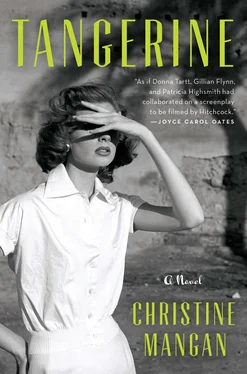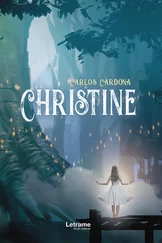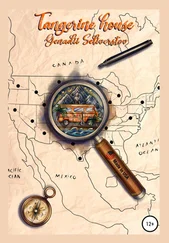“Alice.” Maude was crying, her face drained of color.
I stopped. I looked up into my aunt’s face, into the fear that flooded her features. Her hair had started to come undone, strands of it falling down her face. I turned toward Lucy and saw that she looked equally affected, her pinned hair now falling around her shoulders, her dress askew, her stockings torn, the evidence of my violence written there, across her body. An apology rose on my lips but I stopped, feeling the weight of her papers between my hands. I had to know. And so I cast a hurried glance at the words written on the passport now grasped between my fingers. SOPHIE TURNER. I struggled to breathe.
She was, I realized with a sinking feeling, still one step ahead.
IT WAS EASY ENOUGH TO CONVINCE MAUDE SHIPLEY THAT her niece was going mad.
After that initial telephone call, we had spoken a handful of times before her arrival in Tangier, and I had reported on her niece’s movements, her state of mind, remembering all the while the words that Alice had once spoken to me—about the fear, after her parents’ death, that her aunt had wanted to commit her. The fear that her aunt thought she was mad, the fear that she might just be right.
Alice’s episode that afternoon had only helped. I had almost pitied her, watching how confident she had been, convinced that she was about to best me. As she stood before us, her eyes wide, dazed, her fingers turning the same pages of the passport back and forth, over and over, as if it would somehow change what was printed there, I had been half-tempted to rush to her, to take her in my arms and forgive her for everything that she had done. Instead I had looked away, brushed the instinct aside.
She couldn’t have known that I had already switched passports. That the idea had come to me while sitting in Youssef’s studio, that day he had tried to blackmail me. I had sat still in the moments afterward, afraid to move, to betray any indication of weakness. Only when I had worked it all out in my mind at last did I allow myself to smile, to shift. And then, steeling myself for his response, I had said, “Before I give you the money, I need you to do something for me first.”
Youssef’s eyes had narrowed, surprised no doubt by the audacity of my request.
I held his gaze. “I need a new passport.”
“And why would I do that?” He laughed. “So that you can disappear without paying me?”
“You’ll be paid—and in advance. But if I don’t get new papers, well, what would be the point of paying you to keep quiet? The police will figure it out sooner or later. New papers are my only way out of Tangier. Otherwise I might as well spend my money on enjoying my final hours.” I held my smile, though I could feel it, shaking against my teeth.
Youssef paused, considering my words. I could see him weighing them, carefully, as I had known he would. After all, what did he care if I left Tangier, as long as he got something first? Yes, he would have preferred a longer con, one that continued to earn him something over time, but if forced to choose between nothing and something—he was smart, and I knew where he would fall.
“All right,” he conceded. “I know a man who might be able to help.” He pointed his brush at me. “But only after I have been compensated.”
I nodded. “Agreed.”
His eyes narrowed. “Any tricks, and our deal is off.”
“Understood.” I stretched out my hand toward him. “Shall we shake on it?”
He laughed then, an amused sharp noise that let him indulge in his triumph over the helpless American girl. And I had wanted to give him that before I did what I had to next. His hand felt rough in my own, but I clasped it and shook—as if I had lost, as if he had won, as if the gesture was an acknowledgment of defeat.
Later, out in the streets, I had laughed, marveling that I had once ever doubted his worth.
I WAITED UNTIL MAUDE had convinced her niece to rest, until she had tucked her into bed, as though a child, and emerged a short time later, looking troubled and worn.
“You were right,” she said, her body sinking into the fabric of the sofa. I sat beside her. “Thank you for telephoning me, Sophie. For letting me know what has been happening. I’m afraid Alice has always been prone to such—episodes.” She reached out, placing her hand on top of my own.
Her touch was dry, cold, as if she were immune even to the heat of the desert, as if not even the elements of nature could threaten to overwhelm her. She was implacable. Unmovable. She was, I could not help but think, a woman wasted on a girl like Alice. I imagined what I might have been, the things I might have accomplished, had fate chosen to bestow upon me a relation such as the woman in front of me.
I quickly pushed the thought aside.
“Of course.”
“I’ll confess I had hoped that John was just off with his friends, on a silly little adventure of some sort. It wouldn’t have been surprising, knowing him.” She fixed her gaze on me. “You were here when he went missing. What do you think happened?”
I considered my words carefully before I responded, casting aside those pieces of information that did not serve a purpose here. “I don’t know. They seemed fine, at first, but then it started to become apparent that something was wrong. And then Alice confided in me, about the other woman.” I shook my head. “The last time I saw John, they had a terrible fight. I don’t know what happened after that. I just don’t know,” I whispered, forcing all the emotion I could into those final words, so that they sounded ominous, haunting, so that both of us could feel them refusing to disappear.
She nodded. “The question now, I suppose, is what should be done.”
I affected surprise. “With Alice, you mean?”
“Yes.” She sighed. “I confess, I’ve never really known what to do when it comes to Alice, what the right thing is. She’s rather like my brother, in that respect. I never knew what to say to him either.” She shook her head, a shadow sweeping across her features. “It all seems too much, in a way. That such misfortune should fall upon one girl, so many times. First her parents, and then that boy in Vermont. Now this.” She shook her head. “And this silly business with her old roommate. I don’t understand it at all. She was adamant, you know, that the girl had something to do with the accident at Bennington too. It took all my powers of persuasion to convince the police there that she was out of her mind, that she was just confusing it all—the accident, the girl’s disappearance.”
I felt the weight of her words—of Alice’s accusation—deep within my stomach. “Was it the police who suggested it to her?” I asked, and seeing Maude’s confusion, I continued on, unable to turn back. “About her roommate, I mean. I imagine they could be rather forceful, if necessary.”
Maude shook her head. “No, this was Alice entirely. Why do you ask, dear?”
I blinked, my vision seeming suddenly hazy—obscured, I thought. But then, no—I shook my head, the fluttering in my ear strong and persistent. Unrelenting, I decided. “It just sounds so fantastical,” I said quickly. “So unbelievable. Almost like—” I paused, casting my eyes downward. “Forgive me for asking, Miss Shipley, but has Alice ever been committed?”
Maude’s eyes cut to mine, hard, hesitant. “No. Why do you ask?”
“She seems so—fragile. And you mentioned about the episodes.” I shifted, slightly. “I know we weren’t always the greatest of friends, but there was always something that seemed rather delicate about her,” I continued, thinking back to the day I met her, letting the words become truth. “I worried for her, about her.” I paused. “I had an aunt who was in quite poor health. She used to—well, she used to claim things that weren’t really true. That someone had come into her house and touched her lamps, that someone had moved her furniture. My parents, they decided in the end that it was kinder to put her someplace where she could be looked after.”
Читать дальше












